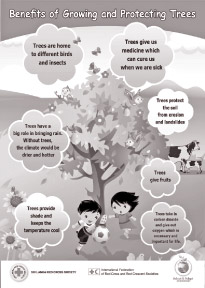Climate Change Adaptation is not a choice - it’s something we need
to do
Sugath Madugalle
Climate Change is one of the most significant problems currently
faced in the world. Global average temperatures have been increasing
which is causing changes in climate at every level. Global climate
change has already had observable effects on the environment.
Effects that scientists had predicted from global climate change are
now occurring such as loss of sea ice, accelerated sea level rise,
longer and more intense heat waves and degradation of biodiversity and
ecosystems. Scientists have high confidence that global temperatures
will continue to rise for decades to come, largely due to greenhouse
gasses produced by human activities.
 But the profile of climate change has risen from being an
environmental issue to a major development issues. It is posing threats
to people’s livelihoods, health, housing and their very existence. The
poor and the underprivileged are most likely to suffer the adverse
impacts of climate change since the majority of those communities depend
on climate sensitive livelihoods such as agriculture and fisheries. But the profile of climate change has risen from being an
environmental issue to a major development issues. It is posing threats
to people’s livelihoods, health, housing and their very existence. The
poor and the underprivileged are most likely to suffer the adverse
impacts of climate change since the majority of those communities depend
on climate sensitive livelihoods such as agriculture and fisheries.
Sri Lanka is a negligible contributor to global warming. However, as
a nation, it is highly vulnerable to the impacts of climate change,
which include: increases in the frequency and intensity of disasters
such as droughts, floods and landslides; variability and
unpredictability of rainfall patterns; increase in temperature; and sea
level rise, among others.
This changing system of climate further reduces the standards of
living of the poor and makes it difficult to achieve the country’s goal
of ‘sustainable development’. Hence, priority attention must be given to
existing environmental degradation and the impeding threats of climate
change as these pose risks to food security and poverty reduction.
Adaptation which involves th adjustment in natural or human systems in
response to actual or expected climatic stimuli or their effects, which
moderates harm or exploits beneficial opportunities is the key strategy
to reduce the negative impacts from climate change.
The Sri Lankan Government has reported to the UNFCC (report 2000)
that the climate change would result in irreversible loss and damages to
the country.
Sri Lanka is experiencing the negative impacts in fishing industry
with rising of temperature and also increasing duration and geographic
coverage of droughts has impacted in reducing the agricultural
production.
Given the impacts that Sri Lanka could face due to the changing
climate, it is necessary for communities, especially at-risk communities
to prepare and adapt to climate change. Even though it is a global
problem, but the solutions are found and made at the local level.
Sri Lanka Red Cross Society (SLRCS) has been contributing towards
many humanitarian activities with special emphasis on disaster relief,
risk reduction and development for more than seventy years.
Through engagement with community, SLRCS has gained a good
understanding of the community’s issues and needs as well as working
with communities in addressing these issues and needs. Over the period
of time SLRCS has also realised that long term perspectives are
necessary when working with communities rather than short-term
interventions for reducing risk.
These long term perspectives would also look at the future climate
scenarios. Therefore SLRCS has taken a conscious and strategic decision
for incorporating climate change analysis into its work.
SLRCS has initiated small but promising steps towards strengthening
it’s work on climate change such as; working with farming communities on
adaptation which are resistant to various natural hazards; awareness
building and education of school children and communities; building
capacities and skills of the staff and volunteers of SLRCS and an island
wide tree planting and awareness campaign.
It has been observed that, even though the considerable efforts were
made both at the policy and programme level to address climate change
issues by government and non-government sectors, there are limited
opportunities to share those good practices among them and interested
communities of practice.
In order to fill this gap, the SLRCS is organizing a seminar on ‘Good
Practices for Climate Change Adaptation’ to bring the practitioners and
policy makers together to share and discuss the good practices and
strategies in adapting to the climate change.
This Seminar will help the participants to further develop their
capacities and understanding on climate change and disaster risks
reduction technologies which will facilitate sharing, replicating and
possible scaling-up of these practices. This Seminar will be held on
June 17,18, 2013 at the BMICH. For more information please visit SLRCS
website www.redcross.lk
|





